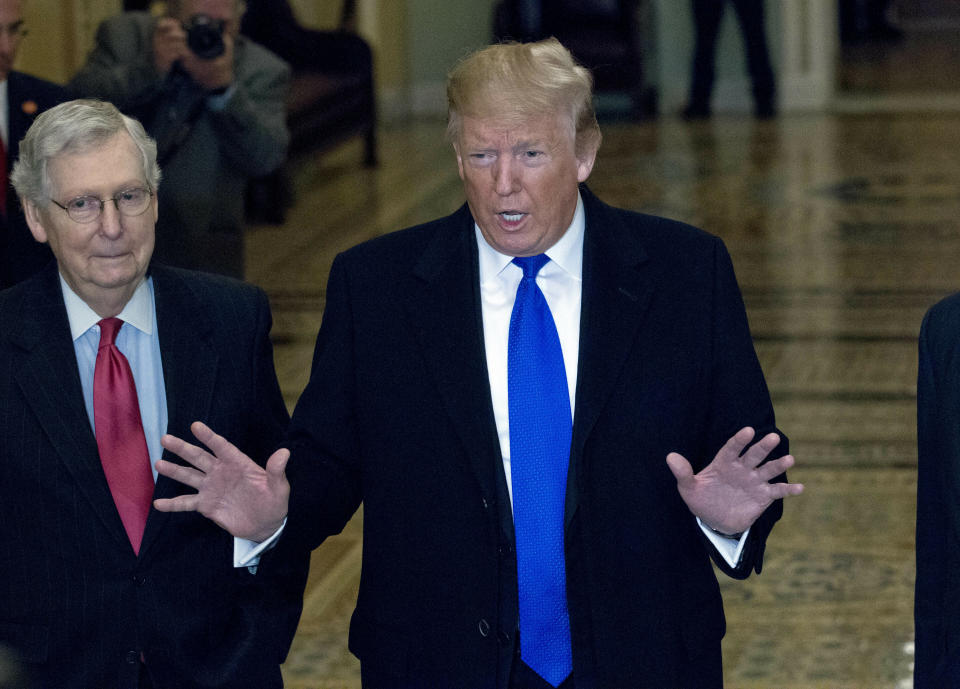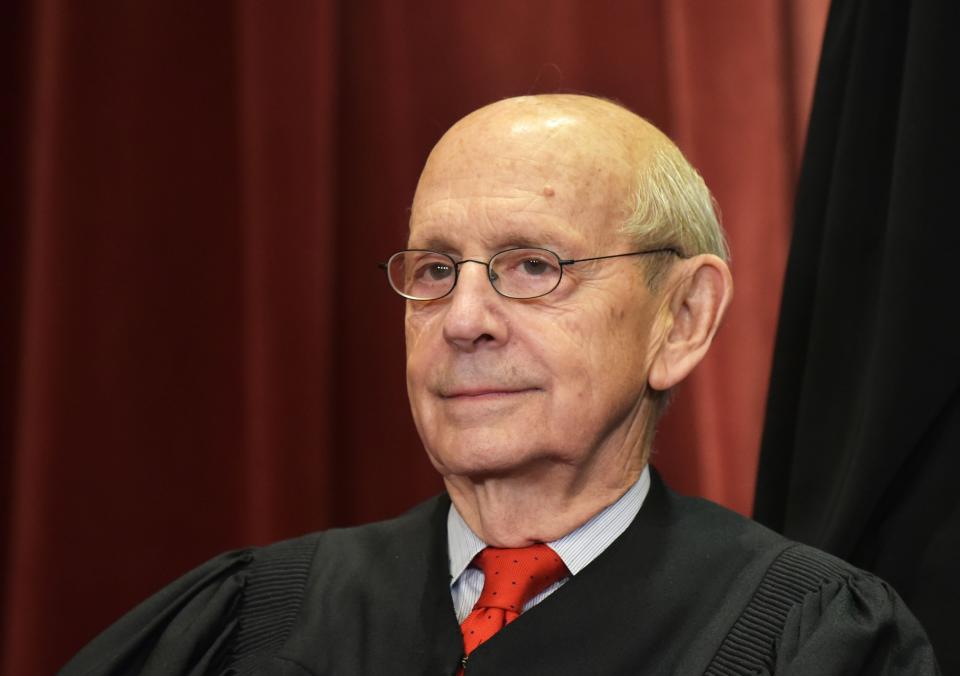Progressive Group Urges Democrats Not To Name Corporate Lawyers To Federal Bench
For decades, Democrats have insisted that liberal judges toe the line on racial justice, women’s rights and other so-called social areas of the law, but have been more welcoming to jurists with pro-corporate records.
Now a leading progressive group is trying to establish stronger standards for economic justice with professional criteria designed to screen out “corporate lawyers” who may be more likely to side with big business.
Demand Justice is calling on Democratic presidential candidates to refuse to nominate to the federal judiciary, including the Supreme Court, people who have achieved the status of “partner” at a corporate firm or worked as in-house counsel at a major corporation. Instead, they want Democrats to look to people with backgrounds less common on the federal bench, like public interest lawyers, public defenders and labor lawyers, Brian Fallon, founder and executive director of Demand Justice, told HuffPost.

The idea is to emulate conservative movements to pack the courts with pro-corporate judges, but in reverse ― a move that, if successful, could stop and eventually reverse the judiciary’s rightward turn. The survival of existing labor, health and environmental regulations and social programs ― to say nothing of future efforts to expand on them ― depends on a robust progressive counterweight to the conservative judicial juggernaut, Fallon argued.
“All the work that Democratic candidates are doing to bring attention to income inequality and the wealth gap in this country ― you can’t talk about that stuff and propose policy solutions intended to address those kinds of problems without having a court-focused strategy, because anything that you might seek to proactively do is going to run into the buzzsaw of a court that’s rigged in favor of corporate interests,” Fallon said. “We have to grapple with that, and grappling with that means making a choice to start nominating people that represent the antithesis of that.”
Demand Justice will fund a five-figure digital advertising campaign in Iowa and New Hampshire to promote its “no corporate judges” project. It has already hired organizers in early states to promote its overall agenda; they will add the new demand to the set of court-related issues on which they are educating voters. The project is part of a larger effort to replicate the systemic and unyielding approach that movement conservatives have applied to reshaping the federal judiciary in the last few decades.
The Supreme Court has worked for years to reify corporate power and limit the rights of workers, activists and governments to curb that power. Since 2006, when John Roberts became chief justice, the Supreme Court has ruled on the side of the U.S. Chamber of Commerce ― the main lobbying arm for corporate America ― 70% of the time, according to an analysis by the progressive Constitutional Accountability Center.
Conservative justices have crafted the most high-profile pro-business decisions. But liberal justices have also often joined their conservative colleagues in siding with corporations. For example, this past June, all four liberal justices joined with three conservative colleagues to strike down a Tennessee rule restricting out-of-state alcohol sellers that is likely to pave the way for the explosion of national liquor store chains. Public health advocates worry that by expanding the reach of big alcohol chains capable of selling cheaper booze, it will increase rates of alcohol abuse.
In particular, Stephen Breyer, a liberal appointed by former President Bill Clinton, has developed a long track record of ruling against broader antitrust enforcement and in support of the growing wave of corporate consolidation.

A major reason why so many liberal justices have less progressive stances on questions of corporate power and economic rights is that they often hail from the same set of elite universities, federal court clerkships and corporate law firms ― the most influential of which are nicknamed “BigLaw” ― as conservative justices, according to Fallon and his allies on the economic left.
About 60% of judges currently serving in federal appeals courts ― the highest stage before the Supreme Court ― previously worked as corporate law partners, according to an analysis conducted by Demand Justice.
Neal Katyal is a legal scholar who exemplifies the prevalence of socially liberal jurists with a bias toward big business. Katyal, a former acting solicitor general in the Obama administration, endorsed the nomination of conservative Justice Neil Gorsuch, a fellow denizen of the elite legal world.
Although Katyal, a Georgetown law professor and partner at one of the country’s largest corporate law firms, argued that Gorsuch’s record suggested he could be counted on to hold Trump accountable, he neglected to disclose that he was representing major corporations with cases that the Supreme Court was in the midst of considering. Katyal went on to represent one of the large corporations defending its right to force employees into private arbitration to settle disputes and sign away their rights to class-action lawsuits. When the court ruled in his client’s favor in June, Gorsuch wrote the deciding opinion.
Fallon and Chris Kang, a former deputy White House counsel under then-President Barack Obama, single out Katyal as an example of the types of ostensibly liberal legal thinkers that they would like to avoid.
Love HuffPost? Become a founding member of HuffPost Plus today.
“We need people that are going to be able to rise to the moment and contest this decadeslong battle that we’re now going to be embarked on,” Fallon told HuffPost. “So for us, that means looking away from one of the default types of nominees that has been prioritized in the past, which is the types of people from the same Ivy League schools that have had the same clerkships and that have gone on to become partners at the same elite set of corporate law firms, where in many cases, they have advocated some of the very policies that corporations put in place that hurt workers’ collective bargaining.”
In an op-ed in The Atlantic announcing the new initiative, Fallon and Kang write that some liberal jurists who have done corporate work in the past have proven to be dogged advocates of corporate accountability once on the bench. For example, Justice Sonia Sotomayor, the first person of Latino descent to serve on the Supreme Court and a judge whose record they approve of, was a partner at a corporate law firm prior to ascending to the federal bench.
But in general, being a corporate law partner is “pretty consistent” with having a bias toward big business, said Matt Stoller, a fellow at the pro-antitrust regulation Open Markets Institute who applauded Demand Justice’s new push. “A lot of Clinton and Obama judges are horrible,” he said.
One of the likeliest objections to Demand Justice’s campaign is that it could conflict with efforts to elevate women, people of color and candidates from other marginalized groups to the federal bench.
Fallon said his group does not see the two goals as at odds. Demand Justice plans to release a list of candidates it would like a Democratic president to nominate the federal judiciary that is heavy on women and people of color. Some names of women and people of color that Fallon and Kang include in their op-ed are labor attorneys Deepak Gupta and Sharon Block; former plaintiffs lawyer Jenny Yang; law professors Tim Wu and Michelle Alexander; and federal judges Jane Kelly and Carlton Reeves.

Fallon, a former spokesman for the presidential campaign of Hillary Clinton and before that, Sen. Chuck Schumer (D-N.Y.), founded Demand Justice in May 2018 as a first-of-its-kind strike force dedicated to combating the conservative takeover of the judicial system.
Demand Justice collaborated with the new Pack the Courts initiative to press Democratic presidential candidates to embrace increasing the number of justices on the Supreme Court. It also created an unsparing public report card of Senate Democrats, giving lawmakers who have greenlit more Trump nominees to the federal bench lower marks, and purchased digital advertisements to keep party activists apprised of the evaluations.
Demand Justice is up against a powerful network of conservatives who wield authority over Republican judicial nominations at multiple points during the political process.
When Trump clinched the GOP presidential nomination, he sought to assuage social conservatives in particular, who were concerned by his lack of ideological rigor, that he would stick to their preferences. A number of prominent conservatives reluctant to vote for Trump cited the fate of the courts when explaining their decision to back him.
Trump, working closely with McConnell, has held up his end of the bargain, seating conservative judicial nominees ― some of them woefully underqualified ― with breakneck speed. In just two and a half years, Trump has already changed the character of the federal court system. One in four federal appeals court judges are Trump appointees.
“There’s a lot to emulate with the way Trump and McConnell have approached judicial nominations,” Fallon said, referring to their prioritization of the judiciary, speed and creative tactics.
Fallon acknowledged that the next Democratic president is not likely to get the chance to fill many conservative-held vacancies and thus change the balance of power in the courts.
But electing a Democratic president committed to replacing retiring liberal judges with even stronger new candidates is an important first step, according to Fallon ― both for its direct ideological implications and the awareness it can help engender among activists.
“One goal of this conversation is to peel the curtain back a little bit and reach people that are bothered by lobbyists working in the government, bothered by the idea of big wealthy bundlers that have outsize influence over candidates” and show them that “that same sort of undue influence that is being exerted by sort of the monied class, that that’s happening in this area as well,” Fallon said.
“We need to create a sense of empowerment and a sense of outrage,” he added. “That takes time in itself.”
This article originally appeared on HuffPost.

